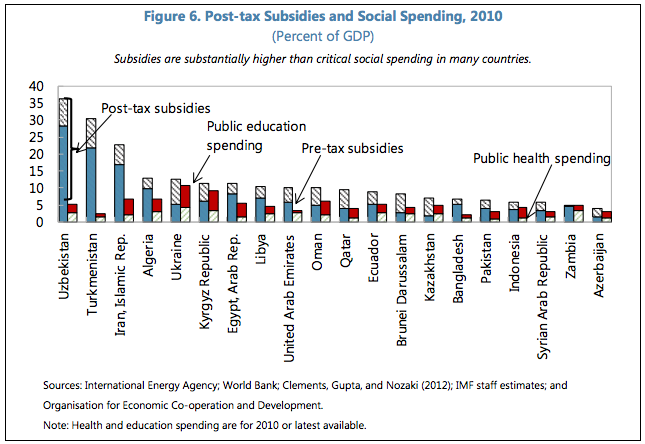The International Monetary Fund released a report on Wednesday urging governments to end subsidies for petroleum, electricity, natural gas and coal, which could reduce carbon dioxide emissions by an estimated 13 percent and lead to lower global energy costs.
The document represents a significant step into the climate change debate for an organization whose policies have been accused of encouraging environmentally damaging practices.
When factoring in potential tax revenue as well as environmental, pollution and traffic costs, the IMF found that energy subsidies around the world amounted to $1.9 trillion in 2011 — about 2.5 percent of the global GDP. This represents a steady increase since the financial crisis hit in 2008.
Yet international energy prices have also continued to rise, indicating that the effects of major subsidies may cost governments, producers and consumers more than they save.
“It is time for subsidies to end and carbon taxation to be put in place,” IMF First Deputy Managing Director David Lipton told the Washington Post. “You don’t want overconsumption based on getting something for less than it costs and forcing someone else to pay.”
Now favored among both importers and exporters, subsidies have been commonly thought to keep energy prices low for consumers by making it easier for companies to trade within a country’s borders. But hidden costs, incurred from overconsumption and its associated burdens on infrastructure and the environment — the IMF estimates damages of $25 per ton of carbon dioxide emissions, for one — often crowd out important public spending.
The chart below shows how 20 countries spend much more on energy subsidies than either public health or public education.

Credit: IMF
And it turns out the benefits of subsidies rarely trickle down to the majority of consumers, anyway. In low- and middle-income nations, the IMF finds, the richest 20 percent of households on average capture six times more in fuel subsidies than the poorest 20 percent. That many of the world’s poor don’t use electricity — like 30 percent of households in sub-Sahara Africa — reinforces the inequality inherent in energy subsidies.
Most subsidies come from the world’s the top oil-exporting countries, especially those in North Africa and the Middle East, a region that accounts for half of all global energy subsidies. But subsidies are also heavily concentrated in Central and Eastern Europe and developing Asia, and as the report notes, “Virtually all of the world’s economies provide energy subsidies of some kind when measured on a tax-inclusive basis.”
















